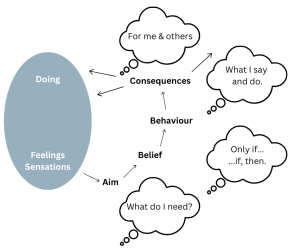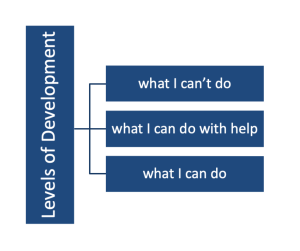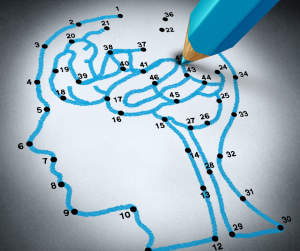What is CAT?
An introduction to cognitive analytical therapy
Cognitive analytical therapy (CAT) is a relational psychotherapy that addresses people’s relationships with themselves, others, and wider society.
CAT is a collaborative way of working that emphasises active participation. It examines how a person thinks, feels, experiences things and acts. It also explores how events and relationships from childhood or earlier in life shape our experiences.
For example, as we grow up, we absorb information about ourselves from our caregivers and the world around us. This information allows us to develop our sense of self.
So, if you’re brought up in a safe environment by caring parents, you’ll learn what safety feels like and what it means to be cared for. However, if neglectful parents raise you in an insecure environment, even unintentionally, you’ll learn to respond accordingly.


These experiences, known as reciprocal roles, are like blueprints for the future, impacting our self-development and personality.
CAT helps us understand the patterns that follow these blueprints and examines how they play out in adulthood.
People with complex lives often present specific behaviours that challenge, such as being harmful to themselves or others. These behaviours typically stem from wanting to escape from a feeling in the blueprint and can result in problems like addiction or difficulty maintaining supportive, healthy relationships.
CAT- or CAT-informed working environments, like YMCA Together, help individuals unpick the patterns formed in earlier life and develop manageable goals for positive behaviour change.

What’s the history of CAT?
Dr Anthony Ryle developed CAT in the late 1970s & early 1980s as a short-term alternative to psychodynamic therapy. Dr Ryle felt it was essential for the NHS to offer a treatment that combined the most effective approaches to dealing with people’s problems and was straightforward to research and evidence.
Therefore, he designed CAT as a time-limited one-to-one therapy that takes between 4 and 24 weeks. Commonly, direct therapy is offered in blocks of 8 or 16 sessions.
However, CAT has evolved from its traditional one-to-one talking therapy into consultancy and indirect working. At YMCA Together, it serves as a framework for psychologically informed working.

Our practitioners develop the skills to recognise harmful behaviour patterns and manage challenging relationships. This evolution of support-based practice allows our staff to have relationally-informed conversations with their teams or people using our services to help them identify their behaviour.
How does CAT work?
The main components of CAT therapy and CAT-informed work are designed around three Rs:
Reformulation helps us understand the underlying issues beneath a person’s behaviour and experiences.
Recognition helps individuals or teams we’re working with recognise and make sense of their behaviour patterns and how they play out.
Revision helps people develop new skills for managing emotions and behaviours before creating a new way of being. It also helps teams find new ways of being alongside people at challenging times.
Who does CAT help?
CAT has the potential to benefit everybody, offering a path to personal growth and self-discovery.
But while we all have some level of problematic patterns and relational flaws, CAT is especially beneficial for people with complex lives. The therapy has been used in the NHS to help people who’ve experienced childhood physical, emotional or sexual abuse, neglect and trauma and people who self-harm.
It’s also helpful for people with eating disorders, drug and alcohol use disorders, compulsive problems, anxiety, depression, phobias, psychosis, bipolar illness, and other conditions.
CAT lets us make sense of various personal complexities, and it’s helpful in ways that other therapy models might not be. It’s not just about addressing symptoms or trauma but about looking at the whole person and understanding what might have happened to them in early life that led them to where they are now.
What are the benefits of CAT?
Whether offering CAT as a direct intervention, consultation or through reflective practice, the primary benefit is increased understanding of each other as individuals.
Direct therapy, for example, can help people increase their self-awareness and understanding of challenging behaviour patterns. CAT, used as a team consultation, helps us expand our understanding of team dynamics.

At YMCA Together, we’ve seen how CAT’s relational approach to understanding and addressing behaviours that challenge can make a significant difference. By reducing these behaviours, we can reduce a person’s risk of harmful situations, improve relationships and wellbeing, and increase people’s potential to live meaningful lives.
CAT is an empathic, respectful, and collaborative therapy that builds positive relationships between individuals, teams, and groups. This cooperative nature is a key factor in its effectiveness. To share good practices, YMCA Together offers CAT training to other organisations.

What CAT training does YMCA Together offer?
YMCA Together provides comprehensive CAT training to individuals, teams and organisations.
Our commitment to the therapy over more than a decade makes us experts in the field.
ACAT, the Cognitive Analytic Therapy accrediting body, accredits our courses.
For additional information, visit engage.acat.me.uk
Our CAT training

2-day introduction to psychologically informed environments using CAT:
An introduction to CAT as a conceptual framework and to ‘knowing ourselves’. Includes core therapeutic skills and change strategies.
6-month CAT Skills for Case Management:
This ACAT-accredited programme supports the development of CAT skills in practice. The training is an opportunity to develop a deeper understanding of CAT principles and to further ‘see ourselves’ in the dialogue. The outcome of this course is proficiency in making use of CAT maps to support work in services.
1-day Reflective Practice Facilitation Using CAT:
An overview of facilitating reflective practice sessions and conversations using CAT.
1-day CAT for Conflict Management:
An introduction to using the CAT model to understand and manage conflict by developing an understanding of our roles in the dialogue.
YMCA Together contributes to an evidence base of good practice and publishes our ways of using CAT:
Contact us to find out more.

If you’d like more information or want to book, please get in touch with our Learning and Development Co-ordinator on hello@ymcatogether.org.uk
